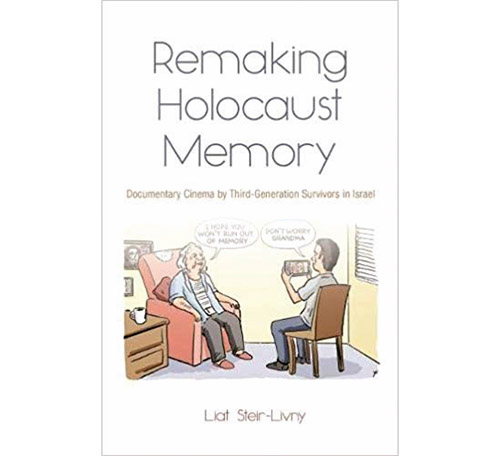
“Remaking Holocaust Memory: Documentary Cinema by Third-Generation Survivors in Israel,” by Liat Steir-Livny. Syracuse University Press. 2019. Paperback. English. 337 pages. ISBN-13: 978-0815636502.
In this work, Liat Steir-Livny, a senior lecturer in the department of culture at Sapir Academic College in Israel and a tutor and course coordinator at The Open University of Israel, explores how the third-generation Israelis, the next “custodians of memory” use art, television, unconventional ceremonies, traditional and avant-garde theater, literature and film to memorialize the Shoah.
Not Another Holocaust Movie
This is a group that is not content to make “another Holocaust documentary” or recycle familiar Shoah images. Many of the third-generation film directors intentionally do not use pictures or the typical narratives, but focus on the Shoah from a different perspectives. They do not concentrate, for example, on the victims and their children, but confront the “voices, choices, claims and conceptions” of the perpetrators, bystanders and their descendants.
Rather than accept testimonies of Holocaust survivors as facts, the third-generation of film makers dispute previous perceptions of their statements and expose what they view as “the complexity and elusiveness” of these declarations.
Gender perspectives are studied by examining how feminine subjects have been marginalized in second-generation documentaries. In this way, their documentaries are less about relating history, and more about the subject of inquiry.
Holocaust—a Pivotal Event in Their Lives
Born between the late 1960s and the early 1980s, the third-generation Israelis were raised in a society where every segment of their culture, educational training and communal discussion viewed the Holocaust as a contemporary and continuing trauma instead of a historical experience that concluded years ago in Europe.
Studies conducted in Israel found that the Holocaust is regarded as a pivotal event among the Israeli Jewish populace in general, and among young Jewish Israelis, the Shoah has had a profound influence on them and their future, even greater than the establishment of the state of Israel.
First Cultural, Cinematic and Sociohistorical Book-Length Study
This volume is the first book-length academic study to investigate the subject from a cultural, cinematic and sociohistorical approach by analyzing the differences between the ways in which the third generation in Israel and second generation portray the Holocaust.
Nineteen documentaries present the central “representations” and are contrasted with 16 Holocaust documentaries produced by members of the second generation. Additional long and short documentaries, television documentaries and episodes from television documentary series that address these issues are also explored.
One of the conclusions reached by Steir-Livny is that that we do not know what shape Holocaust remembrance will take once the survivors have passed on. “Remaking Holocaust Memory” illustrates how third-generation documentaries offer different ideas and views about how to preserve the memory of the Shoah.
Dr. Grobman, a Hebrew University-trained historian, is senior resident scholar at the John C. Danforth Society and a member of the Council of Scholars for Peace in the Middle East.













